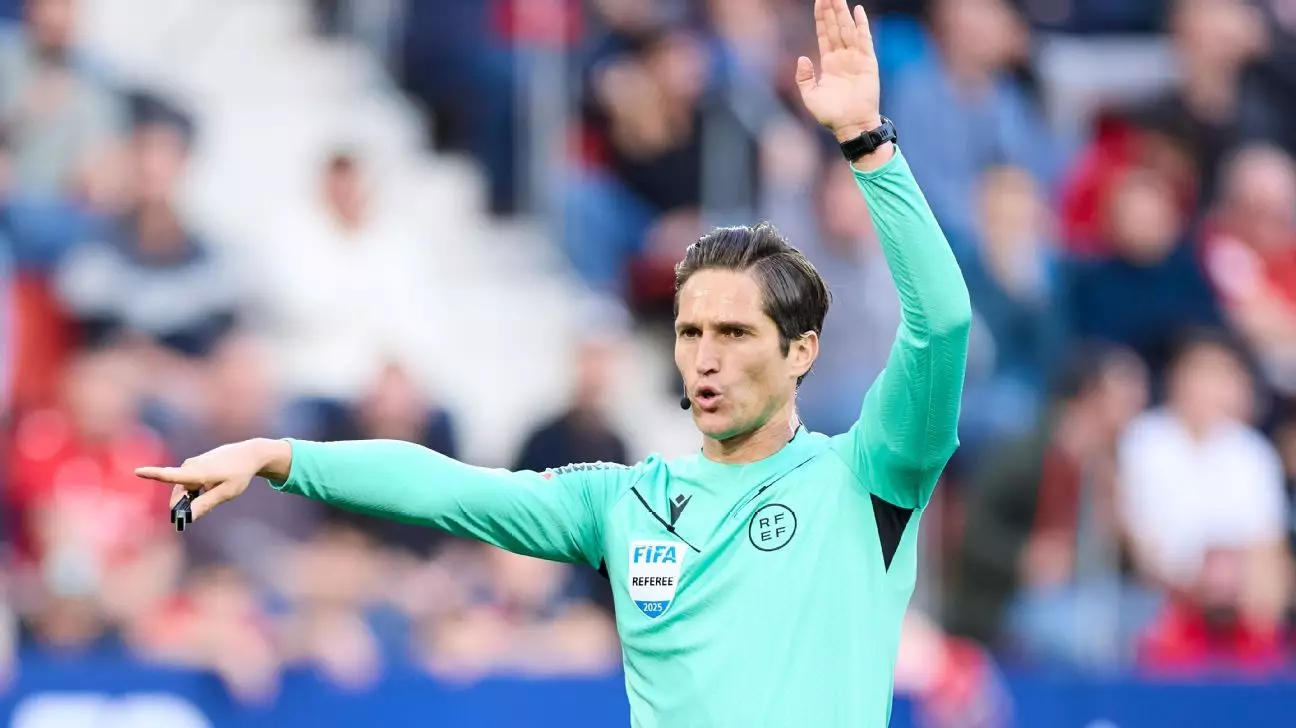The world of football often pulsates with intense emotions, and nowhere is this more evident than in the heated debates surrounding refereeing decisions. Recently, the Spanish football federation (RFEF) announced an investigation into referee José Luis Munuera Montero after a controversial red card issued to Real Madrid’s Jude Bellingham during a match against Osasuna. The situation has ignited discussions about referee credibility, transparency, and the interwoven nature of sports and business interests.
The red card incident involving Bellingham clearly struck a nerve within the Real Madrid camp. Due to a series of contentious officiating calls, the club expressed significant displeasure with the current standards of refereeing in Spain. This frustration reflects broader concerns among clubs and fans alike about the consistency and reliability of officiating in high-stakes matches. The scrutiny surrounding referee Munuera intensified when media reports disclosed potential conflicts of interest linked to his involvement with a company, ‘Talentus Sports Speakers.’ This company, alleged to have business ties with various football organizations including LaLiga, UEFA, and the RFEF, raised questions within Real Madrid and beyond about whether his officiating was influenced by external factors.
In response to the media allegations, Munuera took to social media, refuting claims made against him and ‘Talentus Sports Speakers.’ He stated that the firm has not engaged in any financial transactions with sports entities nor has it generated any revenue since its inception. Munuera suggested that the media’s portrayal of the situation is a “disproportionate attack” on referees, hinting at a growing animosity towards referees, exacerbated by heightened scrutiny after poor officiating decisions. His commitment to pursue legal action against media outlets that he considers to be spreading false information underscores the complex dynamics involved in the relationship between referees, clubs, and media coverage.
In the landscape of Spanish football, the response from clubs towards officiating decisions plays a pivotal role in shaping public perception. After the incident involving Bellingham, Real Madrid executives sought to address their grievances directly with the RFEF, even going so far as to meet with refereeing officials and listen to recorded audio from officiating discussions. This proactive approach reveals a willingness by Real Madrid to fight against perceived injustices, but it also highlights how the narrative around refereeing has become increasingly contentious. Meanwhile, Atlético Madrid’s public backing of referees in their social media post positions them as a counter-narrative to Real Madrid’s criticisms, showcasing the divide between clubs in how they view officiating standards.
The events that unfolded after the Bellingham incident represent not just a crisis for one referee, but suggest an urgent need for reform within the refereeing system in Spain. To maintain the integrity of the sport, it is essential that the RFEF undertakes thorough investigations and implements measures to bolster transparency. This includes enhancing the training and monitoring of officials and ensuring that any potential conflicts of interest—however minor—are disclosed and managed appropriately. The rise of social media has further complicated the narrative around refereeing, as fans and clubs are now more empowered to voice their frustrations, and media outlets can amplify these sentiments, sometimes without the necessary context.
The ongoing drama surrounding referee José Luis Munuera Montero, Real Madrid, and the RFEF encapsulates broader issues of trust and accountability in football. As clubs like Real Madrid and Atlético Madrid navigate these turbulent waters, the need for a more transparent and fair officiating system has never been more apparent. In a sport that holds significant cultural and financial stakes, ensuring that referees can operate free from undue influence and public pressure is crucial for preserving the spirit of fair competition. Only through earnest dialogue and reform can the integrity of the game be upheld, fostering a healthier environment for players, clubs, and fans alike.

